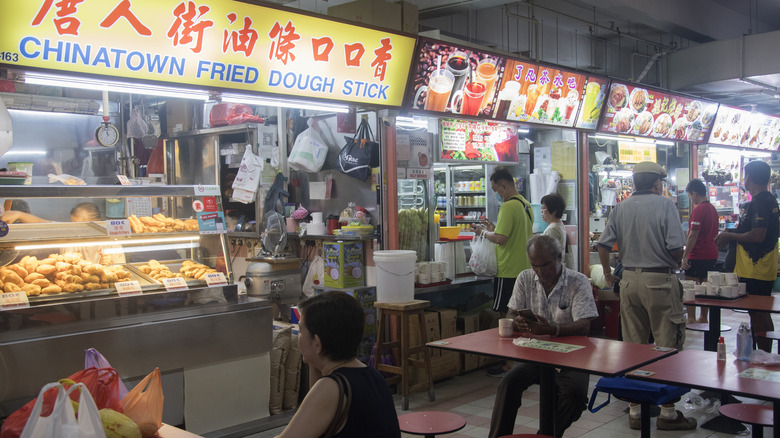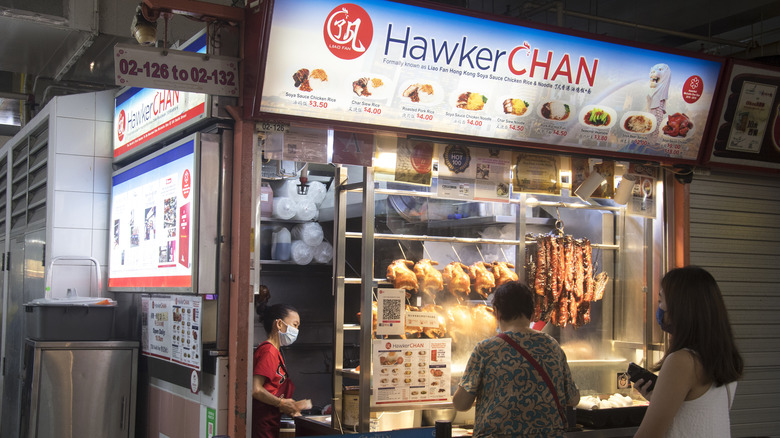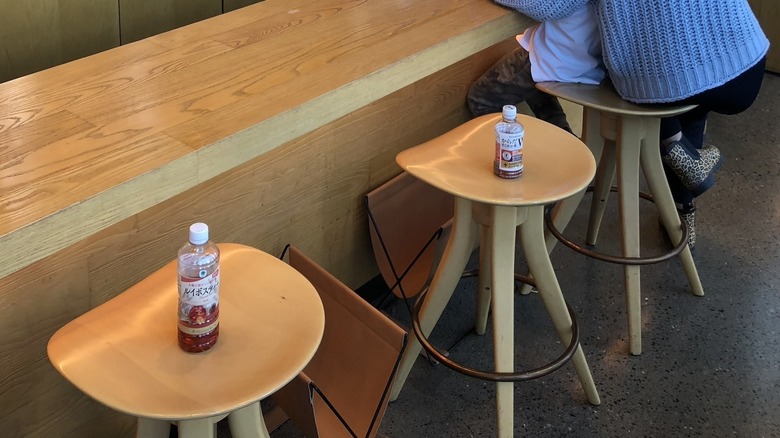The Unspoken Rule Singapore Locals Use At Food Centers That Tourists Need To Know And Respect
You may have seen the world's largest indoor waterfall at the airport, but no Singapore trip would be complete without visiting a hawker center. These open-air food courts offer more than just al fresco dining. They're part of a rich street food tradition in Singapore that UNESCO recognizes as an element of the country's intangible cultural heritage. One thing to know about hawker centers, however, is that you might see people saving seats in them by "chope-ing." The term refers to the custom of reserving a table with an expendable personal item like a tissue packet or umbrella.
According to the South Morning China Post, the word "chope" comes from the Singapore usage of "chop" to describe stamping or leaving your mark on something. In hawker centers, people even chope seats with their phones, but since it relies on the honor system, it's safer to do it with something that's easily replaceable if lost. You may think the table's empty and someone just forgot their umbrella or left behind the tissue packet as trash, but if you move it aside and grab the seat, you'd be breaking an unwritten rule. It would be almost like invading the tent where someone has camped out in line for an event overnight. At the very least, it could be awkward when the person returns with their food to find you sitting in their seat. This is why it's good to know what chope-ing is and respect it when you see it in Singapore.
Hawker centers where you can chope seats
You don't have to be a passive observer with chope-ing. You can also try it out yourself in Singapore's hawker centers. When I visited the country, I stayed near two popular ones in Chinatown: the Maxwell Food Centre and Chinatown Food Street. You haven't lived until you've polished off a plate of chili crab at one of these places. Newton Food Centre was also seen in the movie "Crazy Rich Asians," where a character noted that Singapore "is one of the only places in the world where street food vendors actually earn Michelin stars."
Hong Kong Soya Sauce Chicken Rice and Noodle — now known as Hawker Chan — was the world's first street food stall to receive one Michelin star. You can chope a seat near the original Michelin-starred location at 335 Smith Street in the Chinatown Complex Market & Food Centre. Another location at 78 Smith Street received Michelin's Bib Gourmand award for good-quality value cooking.
As the name implies, stalls like Hawker Chan arose from the tradition of street vendors hawking food to passers-by. In the interest of public health and food safety, the government began regulating the vendors and confining them to localized centers in the late 1960s. To keep Singapore clean, it also banned chewing gum in the early 1990s. While there's no comparable fine for stealing someone's seat like there is with littering gum, it could still be considered a party foul. So, when in Singapore, respect the chope.
Chope-ing beyond borders
Singapore isn't the only country where the practice of saving seats with small personal items has taken root. In 2022, a TikToker made waves with a video where he suggested this custom was observed "only in Japan." In the video, he wandered around a food court, showing seats saved with hand towels and shopping bags.
My first Singapore trip came after living in Japan for years, so I was used to the custom and it didn't jump out at me as noteworthy in hawker centers. In Tokyo, you can see people claiming seats with plastic drink bottles even in places like the Starbucks Reserve Roastery (one of the best spots to view cherry blossoms in the city). If anything, I've been more surprised to see foreign tourists ignore the unwritten rule and grab seats other people were already chope-ing.
Commenters from Norway, South Korea, and the United Arab Emirates spoke up in reaction to the TikTok video to say there's a similar social tradition in their country. What makes Singapore different is that it has its own unique word for the practice that can be readily adopted into English. When your trip there is over, you'll come away from it with a kind of Singlish souvenir in your vocabulary. In your other travels, if you ever see people saving seats this way again, you can think of it as "chope-ing" and know that you're now carrying a little piece of Singapore with you everywhere you go.


